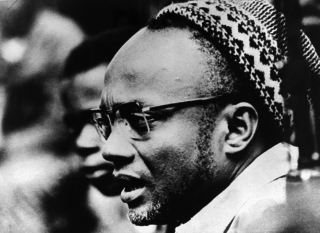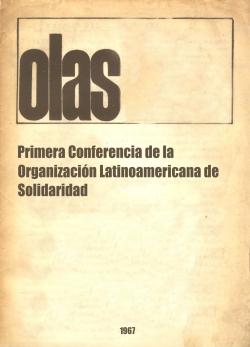See also
- Tricontinental Chile, a geopolitical concept denoting Chile's unique position with territory over three continents
Tricontinental is a quarterly left-wing magazine founded after the Tricontinental Conference in 1966.
Tricontinental, Tri-continental, or Tri Continental may also refer to:
ATP may refer to:

Amílcar Lopes da Costa Cabral was one of Africa's foremost anti-colonial leaders. He was a Bissau-Guinean and Cape Verdean agricultural engineer, political organizer, and diplomat. He was also a pan-Africanist and intellectual nationalist revolutionary poet.
The Organization of Solidarity of the Peoples of Asia, Africa and Latin America, abbreviated as OSPAAAL, was a Cuban political movement with the stated purpose of fighting globalisation, imperialism, neoliberalism, and defending human rights. The OSPAAAL was founded in Havana in January 1966, after the Tricontinental Conference, a meeting of over 500 delegates and 200 observers from over 82 countries.
Tricontinental is a left-wing quarterly magazine founded after the Tricontinental Conference 1966. The magazine is the official publication of the Organization of Solidarity with the People of Asia, Africa and Latin America (OSPAAAL) which also published it until 2019.
AGI or Agi may refer to:

Morris Mike Medavoy is an American film producer and business executive. He is the co-founder of Orion Pictures (1978), former chairman of TriStar Pictures, former head of production for United Artists (1974–1978), and the current chairman and CEO of Phoenix Pictures.
The Battle of Los Angeles was an anti-aircraft artillery barrage in February 1942 over Los Angeles, California, in response to a perceived attack on the continental United States by Imperial Japan, subsequently attributed to a case of "war nerves" likely triggered by a lost weather balloon.

Jane Arden was a British film director, actress, singer/songwriter and poet, who gained note in the 1950s. Born in Pontypool, Monmouthshire, she studied at the Royal Academy of Dramatic Art. She started acting in the late 1940s and writing for stage and television in the 1950s. In the 1960s, she joined movements for feminism and anti-psychiatry. She wrote a screenplay for the film Separation (1967). In the late 1960s and 1970s, she wrote for experimental theatre, adapting one work as a self-directed film, The Other Side of the Underneath (1972). In 1978 she published a poetry book. Arden committed suicide in 1982. In 2009, her feature films Separation (1967), The Other Side of the Underneath (1972) and Anti-Clock (1979) were restored by the British Film Institute and released on DVD and Blu-ray. Her literary works are out of print.

The Ñancahuazú Guerrilla or Ejército de Liberación Nacional de Bolivia was a group of mainly Bolivian and Cuban guerrillas led by the guerrilla leader Che Guevara which was active in the Cordillera Province of Bolivia from 1966 to 1967. The group established its base camp on a farm across the Ñancahuazú River, a seasonal tributary of the Rio Grande, 250 kilometers southwest of the city of Santa Cruz de la Sierra. The guerrillas intended to work as a foco, a point of armed resistance to be used as a first step to overthrow the Bolivian government and create a socialist state. The guerrillas defeated several Bolivian patrols before they were beaten and Guevara was captured and executed. Only five guerrillas managed to survive, including Harry Villegas, and fled to Chile.

Gian Godoy RIBA Part 1 is a filmmaker, architectural designer and artist.

The Silver Fez is a 2009 South African documentary feature film directed by Lloyd Ross.

Continental Chile is the name given to the Chilean territory located on the continental shelf of South America. This term serves to distinguish the South American area from the insular territories, known as Insular Chile, as from the Antarctic Chile. The existence of this three areas of effective or claimed Chilean sovereignty is what supports the existing tricontinental principle in this country.
The Pan African Federation of Filmmakers, formed in 1969 and inaugurated in 1970, is "the continental voice of filmmakers from various regions of Africa and the Diaspora", It focuses on promoting African film industries in terms of production, distribution, and exhibition.
Maoism–Third Worldism (MTW) is a broad tendency which is mainly concerned with the infusion and synthesis of Marxism—particularly of the Marxist–Leninist–Maoist persuasion—with concepts of non-Marxist Third Worldism, namely dependency theory and world-systems theory.
The following lists events that happened during 1966 in Chile.

Insular Chile, also called Las islas Esporádicas, or "the Sporadic Islands", is a scattered group of oceanic islands of volcanic origin located in the South Pacific, and which are under the sovereignty of Chile. The islands lie on the Nazca Plate, separate from the South American continental plate.
The Tricontinental Conference was a gathering of countries that focused on anti-colonial and anti-imperial issues during the Cold War era, specifically those related to Africa, Asia, and Latin America. The conference was held from 3rd to 16 January 1966, in Havana, Cuba and was attended by roughly 500 delegates from 82 different countries. It founded the Organization of Solidarity with the People of Asia, Africa and Latin America (OSPAAAL). The key issues discussed at the conference were countries that were in midst of revolutions, with a specific focus on Cuba and Vietnam.
Havana Declaration or Declaration of Havana may refer to:

The Latin American Solidarity Organization, or simply OLAS, was an organization created in August 1967 in Cuba on the initiative of the then president of Chile, Salvador Allende, composed of several revolutionary and anti-imperialist movements in Latin America that, to a greater or lesser extent, shared the strategic proposals of the Cuban Revolution. The organization's motto was "The duty of every revolutionary is to make the revolution".